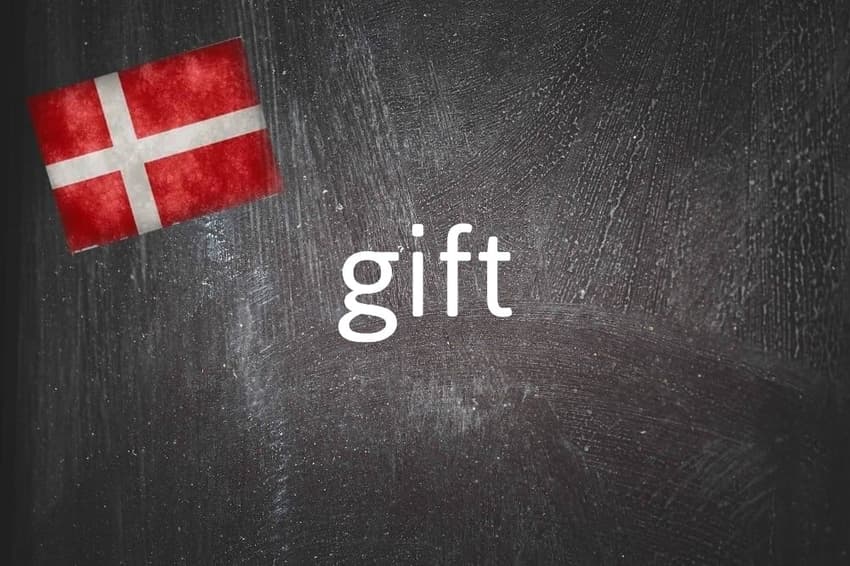Danish word of the day: Gift

Photo by Francesco Ungaro on Unsplash and Nicolas Raymond/FlickR
Today’s Danish word of the day is a false friend with two very different meanings.
What is gift?
Gift means both 'married' (when used as an adjective) and 'poison' (when used as a noun), something that has caused confusion to plenty of Danish language-learners.
It's not as strange as it might seem.
Both forms of gift have their roots in the Old Norse word gipt, which meant 'something given'. Over the years, the meaning changed very little in English, which is where the word 'gift' comes from, but in the Nordic languages, the word developed into giva, which became closely associated with marriage.
Far from modern-day weddings in which both partners are equal before the law, years ago marriage involved a father 'giving away' his daughter (as is still the case in many places).
The Danish word for dowry is medgift, and gift came to be used as the adjective meaning married (literally, 'given'), but today there is no negative or sexist connotation and it describes married men as well as women.
Why do I need to know gift?
'False friend' is the name given to words that look and sound like a word in another language but mean something completely different. The Danish word gift is a step beyond that: it has two distinct meanings, neither of which is the same as the English 'gift'.
In Germany, the word gipt went on a very different etymological journey. Several centuries ago, gift was used to mean 'a present' but over the years the meaning changed until it became used solely as a euphemism for poison somewhere around the year 800.
At some later point, the Nordic language borrowed the noun gift (poison) back from German.
To avoid confusion, it helps to learn the related words to each use of gift.
The verb 'to marry' is at gifte sig (reflexive) or at blive gift, while the noun (marriage) is et ægteskab.
In the sense of 'poison', the adjective 'poisonous' is giftig and the verb 'to poison (someone)' is at forgifte (nogen). Sports fans might also have heard the word giftig used to describe a footballer who is particularly dangerous in front of goal.
Meanwhile, the Danish word for a gift (present) is the distinct but related en gave.
Example sentences
Hun er gift og har to små børn.
She is married and has two small children.
Hun har fået madforgiftning.
She has contracted food poisoning.
Comments
See Also
What is gift?
Gift means both 'married' (when used as an adjective) and 'poison' (when used as a noun), something that has caused confusion to plenty of Danish language-learners.
It's not as strange as it might seem.
Both forms of gift have their roots in the Old Norse word gipt, which meant 'something given'. Over the years, the meaning changed very little in English, which is where the word 'gift' comes from, but in the Nordic languages, the word developed into giva, which became closely associated with marriage.
Far from modern-day weddings in which both partners are equal before the law, years ago marriage involved a father 'giving away' his daughter (as is still the case in many places).
The Danish word for dowry is medgift, and gift came to be used as the adjective meaning married (literally, 'given'), but today there is no negative or sexist connotation and it describes married men as well as women.
Why do I need to know gift?
'False friend' is the name given to words that look and sound like a word in another language but mean something completely different. The Danish word gift is a step beyond that: it has two distinct meanings, neither of which is the same as the English 'gift'.
In Germany, the word gipt went on a very different etymological journey. Several centuries ago, gift was used to mean 'a present' but over the years the meaning changed until it became used solely as a euphemism for poison somewhere around the year 800.
At some later point, the Nordic language borrowed the noun gift (poison) back from German.
To avoid confusion, it helps to learn the related words to each use of gift.
The verb 'to marry' is at gifte sig (reflexive) or at blive gift, while the noun (marriage) is et ægteskab.
In the sense of 'poison', the adjective 'poisonous' is giftig and the verb 'to poison (someone)' is at forgifte (nogen). Sports fans might also have heard the word giftig used to describe a footballer who is particularly dangerous in front of goal.
Meanwhile, the Danish word for a gift (present) is the distinct but related en gave.
Example sentences
Hun er gift og har to små børn.
She is married and has two small children.
Hun har fået madforgiftning.
She has contracted food poisoning.
Join the conversation in our comments section below. Share your own views and experience and if you have a question or suggestion for our journalists then email us at [email protected].
Please keep comments civil, constructive and on topic – and make sure to read our terms of use before getting involved.
Please log in here to leave a comment.